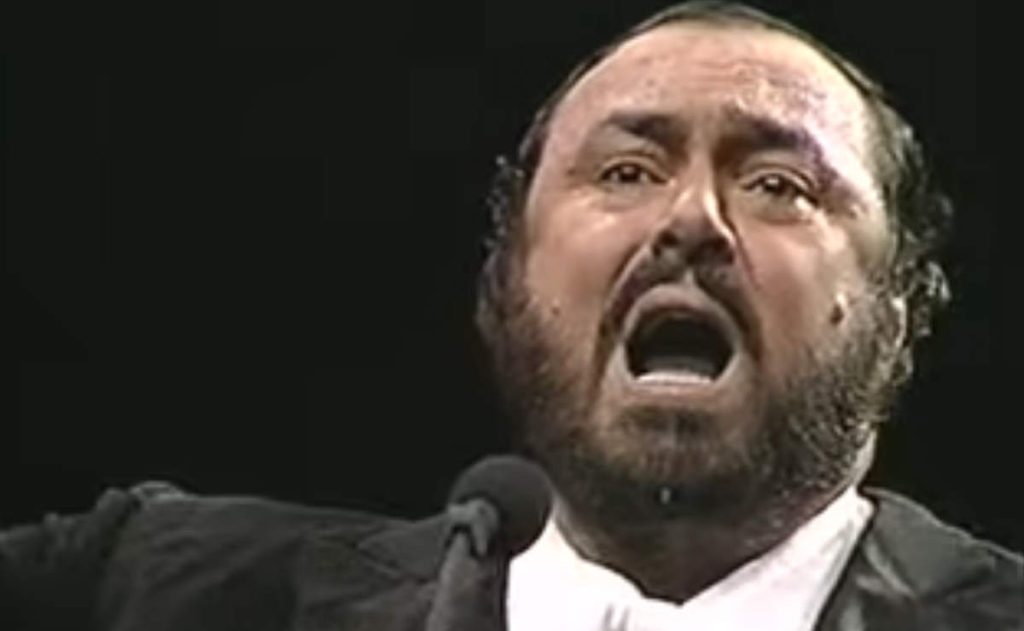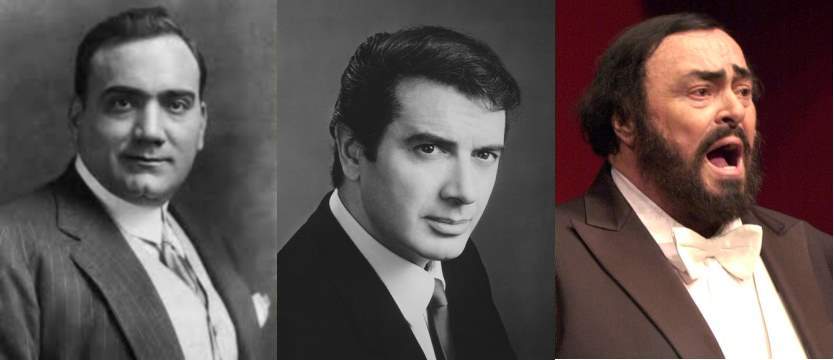Two famous operatic arias from the legendary Italian dramatic tenor Mario Del Monaco (27 July 1915 – 16 October 1982), who earned worldwide acclaim for his powerful voice: “Nessun Dorma” from Turandot, an opera in three acts by Giacomo Puccini, and “Di quella pira”, a short tenor aria (or more specifically, a cabaletta) sung by Manrico in act 3, scene 2, of Giuseppe Verdi’s opera Il trovatore.
Nessun Dorma
Nessun dorma is one of the best-known tenor arias in all operas. It is sung by Calaf, il principe ignoto (the unknown prince), who falls in love at first sight with the beautiful but cold Princess Turandot. However, any man who wishes to wed Turandot must first answer her three riddles; if he fails, he will be beheaded.
Prince Calaf attempt the impossible.
Her first riddle is told:
“What is born each night and dies at dawn?”
Prince Calaf answers: “Hope!”. Correct.
Turandot, unaffected, asks her second riddle:
“What flickers red and warm like a flame, yet is not fire?”
“Blood.” Calaf is right again. No suitor has proceeded this far, ever. This time, the princess becomes unnerved. She asks her third riddle:
“What is like ice yet burns?”
Silence falls over the crowd. A few moments later, Calaf shouts, “Turandot!” He is right again. The crowd cheers and congratulates Calaf, thankful his life was not lost and future lives were saved.
Nonetheless, the cruel princess recoils at the thought of marriage to him. She pleads with her father to spare her marriage to Prince Calaf, some stranger. Her father refuses. In order to appease the princess, Prince Calaf offers her another chance by challenging her to guess his name by dawn.
(As he kneels before her, the Nessun dorma theme makes a first appearance, to his words, “Il mio nome non sai!”)
If she does so, she can execute him; but if she does not, she must marry him. The cruel and emotionally cold princess then decrees that none of her subjects shall sleep that night until his name is discovered. If they fail, all will be killed.
As the final act opens, it is now night. Calaf is alone in the moonlit palace gardens. In the distance, he hears Turandot’s heralds proclaiming her command. His aria begins with an echo of their cry and a reflection on Princess Turandot:
Nessun dorma! Nessun dorma!
Tu pure, o Principessa,
nella tua fredda stanza,
guardi le stelle
che tremano d’amore, e di speranza!
Ma il mio mistero è chiuso in me;
il nome mio nessun saprà!
No, No! Sulla tua bocca
lo dirò quando la luce splenderà!
Ed il mio bacio scioglierà
il silenzio che ti fa mia!
None shall sleep! None shall sleep!
Even you, O Princess,
in your cold bedroom,
watch the stars
that tremble with love and with hope!
But my secret is hidden within me;
none will know my name!
No, no! On your mouth
I will say it when the light shines!And my kiss will dissolve
the silence that makes you mine!
Just before the climactic end of the aria, a chorus of women is heard singing in the distance:
Il nome suo nessun saprà,
E noi dovrem, ahimè, morir, morir!
No one will know his name,
and we will have to, alas, die, die!
Calaf, now certain of victory, sings:
Dilegua, o notte!
Tramontate, stelle!
Tramontate, stelle!
All’alba vincerò!
Vincerò! Vincerò!
Vanish, o night!
Fade, you stars!
Fade, you stars!
At dawn, I will win!
I will win! I will win!
Di quella pira
In a chamber adjoining the chapel at Castellor, Leonora, and Manrico vow their love for each other. After Manrico’s aria “Ah sì, ben mio coll’essere” (“Ah, yes, my love, in being yours”), they are about to take their marriage vows. However, Ruiz, Manrico’s comrade, suddenly returns to report that Manrico’s mother Azucena is to be burned at the stake. Manrico calls together his soldiers and sings of how they will save Azucena from death: “Di quella pira l’orrendo foco tutte le fibre m’arse, avvampò!…” (“The horrible blaze of that pyre burned, enflamed all of my being!…”)
Italian
Di quella pira l’orrendo foco
Tutte le fibre m’arse avvampò!…
Empi spegnetela, o ch’io tra poco
Col sangue vostro la spegnerò…
Era già figlio prima d’amarti
Non può frenarmi il tuo martir.
Madre infelice, corro a salvarti,
O teco almeno corro a morir!
English translation
The terrible flame of that pyre
sets my whole being on fire!
Put out that fire, wretches
or your own blood shall extinguish it…
I was her son before I loved you,
I cannot abandon her now.
My unhappy mother, either I shall save you
or I shall die beside you!
Sources
- Turandot on Wikipedia
- Nessun Dorma on Wikipedia


